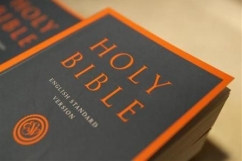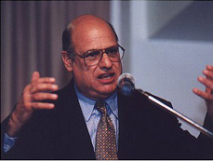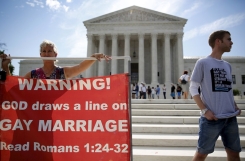So, same-sex marriage is legal across the United States. It's a great victory for the equal rights movement, and it's also heralded the latest chapter in what's becoming a definitive period for evangelicals. For some Christians this is a sign that our society is shifting further away from the Christian values upon which it was founded; for others it's a natural step for a culture that is democratic, not theocratic.
While opinion has been split within the church, it's fair to say that the 'no' camp has been loudly and easily caricatured by the media. To an outside world reading the pronouncements of leaders like Pat Robertson, it probably appears as if most Christians are strongly opposed to the change in the law, which means that homosexual couples in America can have a legally recognised marriage, although not necessarily a 'Christian marriage.' That's a vital distinction too; the Supreme Court isn't forcing the Church or any other religious group to redefine marriage; what the ruling does is widen the legal definition of a 'state' marriage.
This is a really hard moment for Christian witness. In a free speech society, we should absolutely defend the expression of a broad spectrum of opinion, but I believe that Christians have to try a lot harder to say sensible, intelligent, well-reasoned things about SSM, or risk becoming caricatured as 'anti gay' and ill thought through.
That doesn't mean we automatically need to come out as 'pro-SSM'. I also don't believe it's inconsistent to uphold the 'traditional' belief that same-sex relationships are not God's best for humanity, while being fully supportive of laws which extend the same rights to everyone without prejudice.
It's worth considering why some of us hold such strong convictions about SSM, especially within the boundaries of state marriage. It's my belief that in many (not all) cases, our reasons are based in lazy or deferred thinking. Here are five examples of what I believe are bad justifications for opposing same sex marriage:
1) Someone convincing said we should: As much as Christians should honour and listen to those who have been placed in leadership above us, it doesn't follow that every church leader and self-appointed Christian commentator* in the world deserves our submission. Just because a well-read theologian (who may also be heavily prejudiced) says something is wrong or right, it doesn't excuse us the hard work of working out the truth for ourselves. This cuts both ways: the compelling, gracious-sounding voices in the pro-SSM camp are also responsible for sweeping a host of people into a supportive position who've never actually processed the questions independently.
*Yes, I'm aware of the irony here.
A better approach: We should do the reading and thinking for ourselves, or at least check the Bible against the soundbites of commentators on both 'sides.'
2) 'The Bible says so': In a similar vein, it's far too easy (and not very thoughtful) to heavy-handedly grab a few of the Bible's 'clobber passages' and apply them to the issue of state-sanctioned marriage. Even a conservative reading of these verses draws an opposition to same-sex relationships for the community of God's people, not the wider world. Many Christians seem to assume that because the Bible is 'clear on homosexuality', there's a passage somewhere which comprehensively states that "if thou findeth a man married to a man, thou shalt be permitted to stone them both." The reality is that the Bible describes – although doesn't necessarily condone – a 'world' outside into which we're to go and be salt and light. It doesn't tell us to go and conquer it by force; to turn it into a theocracy.
A better approach: It might be time to be a little clearer about the various questions involved, and differentiate between what the Bible says about homosexual sex and the equal rights of gay couples, rather than lumping them all together.
3) We find the idea 'unpleasant': I'm going to call something out here, and it may be a little controversial to do so. I believe that an awful lot of Christian and conservative rejection of SSM, and of same-sex relationships in general, is rooted in an issue of aesthetics. That is to say: I think many conservatives find the idea of sexual relations between two people of the same sex unpleasant. It's rare that you'll find someone who'll actually admit this, but years of anecdotal conversation makes me fairly certain this is a widespread reality. And opposing someone's right to be with the person they love because you find their relationship 'icky', is a pretty terrible rationale.
A better approach: This is one where we need to check our own hearts before God, and be really honest. For many people, this will not be a major issue. For some, it will be.
4) It's corroding our Christian morality: The idea that SSM breaks down the fabric of our 'Christian' society takes a rather rose-tinted view. If same-sex marriage moves us a few steps away from the kind of culture that God intends, then how much more does our prevailing model of Western capitalism, where rich get richer and poor get poorer, and a little more so every year, undermine his ideals for us? Thousands of churches have mobilised across the US to oppose the Supreme Court ruling; I'm not sure I remember the last time they did that over Wall Street bonuses. When Jesus told the pharisees that 'you strain out a gnat and swallow a camel', I think this is exactly the sort of blind-spotted thinking he was talking about.
A better approach: Let's start getting angry about the things that really do run counter to Jesus' kingdom vision – starting with our attitudes to consumerism.
5) It undermines traditional marriage: On the one hand, this idea seems a bit silly; my 12-year-strong heterosexual marriage isn't feeling particularly under threat by gay activism. However the fear among Christians that the holy institution of Christian marriage is being eroded by the world is more understandable. As Mark Woods wrote though, the Supreme Court hasn't tried to redefine Christian marriage, only to create a way in which same sex couples can have a legally-recognised 'state' marriage. And is that really any of our business?
A better approach: Divorce rates are the same inside the church as outside it. The real challenge to 'traditional marriage' is for it to start modelling something worth aspiring to.
By now I'm sure you have me pegged as a rainbow-flag waving liberal. Actually I'm not; I continue to wrestle with the questions around same-sex attraction and the Bible, and I remain uncomfortable and un-concluded on what scripture says to same-sex couples who want to practise the faith and get married. My point however is that if Christians are going to oppose same-sex marriage, then we should probably have reasons that are underpinned by slightly less flawed thinking, and don't emerge out of any prejudices we might be carrying around.
I don't believe we need to 'oppose' same-sex marriage. As Mark wrote, it's an issue on which a post-Christian culture should make its own decisions. What we can still have an opinion on, is SSM within the church, ie between LGBT Christians, since the picture Luke and Paul draw of the early church is a place where brothers and sisters restore and correct one another.
However, even if we're going to do that, then we must think and pray with extraordinary care before wading in. That means taking time to read the Bible as a whole, and processing its Genesis-to-Revelation symbolism of marriage being between a man and a woman. It means getting on to our knees with great earnestness and asking God to reveal his heart – and then also taking time to listen for his response. It means listening to the stories of people on every side of the conversation, and listening harder for the voice of the Spirit within them. Most of all, it means approaching the whole issue with grace, whatever our starting position, and in that submitting to the possibility that we might just be wrong.
Martin Saunders is a Contributing Editor for Christian Today and the Deputy CEO of Youthscape. You can follow him on Twitter: @martinsaunders


















